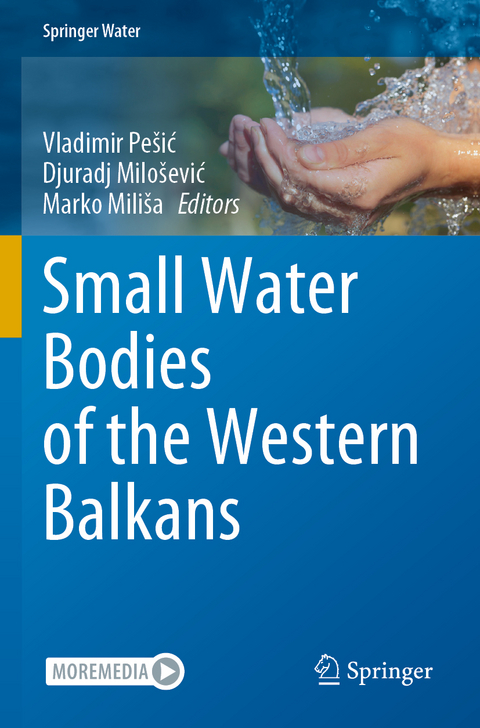
Small Water Bodies of the Western Balkans
Springer International Publishing (Verlag)
978-3-030-86480-4 (ISBN)
lt;p>Prof., Dr. Vladimir Pesic is a full professor at the Department of Biology, University of Montenegro. His research interest covers: taxonomy, ecology, and biogeography of freshwater macroinvertebrates; ecological research of spring ecosystems and intermittent streams; environmental monitoring. He discovered more than 350 species new for science from all parts of the world. Publications: He is the author of over 350 peer-reviewed papers, author and/or editor of several books including "Süßwasserfauna von Mitteleuropa. Bd. 7/2-3 Chelicerata", "The Skadar/Skodra Environment", and "The Rivers of Montenegro" published by "Springer". He is the editor-in-chief of "Ecologica Montenegrina" and a member of the editorial board of several international journals.
Prof., Dr. Djuradj Milosevic is an associate professor at the Department of Biology and Ecology Faculty of Sciences and Mathematics University of Nis. His specific areas of interest are community ecology and bioindication and biomonitoring, as well as the ecology of the Chironomidae family. He is using sophisticated multivariate techniques (an artificial neural network) in modelling community structure of aquatic biota including both local and spatial processes. Using the integrative approach, he is working on defining the bioindicatiors and biomonitors with increased sensitivity, enable to response in a fine-tuned manner. During his time as a lecturer at the University of Nis, he has been the coordinator and main instructor of unique courses in ecology, conservation biology, and bioindication and biomonitoring. He has also supervised a number of M.Sc. and Ph.D. dissertation students. To date, he has published 41 peer-reviewed contributions and reviewed more than 40 papers for 11 journals, including Scientific Reports - Nature, Science of Total Environment, Ecological Indicators, Fundamental and applied limnology, CLEAN - Soil, Air, Water. He is awarded "Outstanding Contribution in Reviewing" from Science of total Environment (2017). Finally, he is a principle investigator of one national (III43002) and co-principal investigator in one international (ECOBIAS) project.
Springs as essential water sources for dependent ecosystems in karst.- Small standing-water ecosystems in the transitional temperate climate of the Western Balkans.- Conservation value and habitat diversity of fluvial lakes and gravel pits in river-floodplain systems.- Fountains - overlooked small water bodies in the urban areas.- Temporary ponds in Mediterranean islands: oases of biodiversity.- Riparian springs - challenges from a neglected habitat.- Ecological characteristics and specifics of spring habitats in Bosnia and Herzegovina.- Algae in shallow and small water bodies of Serbia: a frame for species and habitat protection.- Springs and headwater streams in Serbia: the hidden diversity and ecology of aquatic invertebrates. Springs of Southeastern Serbia with a focus on the Vlasina Plateau: different types of challenges for the macroinvertebrate community. Gastropods in small water bodies of the Western Balkans - Endangerments and threats. Importance of small water bodies for diversity of leeches (Hirudinea) of Western Balkan.- Karst springs: isolated ecosystem ecology from the water mite perspective.- Large branchiopods in Small Water bodies: A case study of the Ramsar site "Bardaca Wetland" (NW Republic of Srpska, Bosnia and Herzegovina).- How important are small lotic habitats of the Western Balkans for local mayflies?.- Fish communities over the Danube wetlands in Serbia and Croatia.- The importance of small water bodies' conservation for maintaining local amphibian diversity in the Western Balkans.- Human impact induces shifts in trophic composition and diversity of consumer communities in small freshwater ecosystems. Pollution of small lakes and ponds of the Western Balkans - assessment of levels of potentially toxic elements. Conclusions: Small water bodies of the Western Balkans - values and threats.
| Erscheinungsdatum | 22.11.2022 |
|---|---|
| Reihe/Serie | Springer Water |
| Zusatzinfo | VII, 451 p. 117 illus., 107 illus. in color. |
| Verlagsort | Cham |
| Sprache | englisch |
| Maße | 155 x 235 mm |
| Gewicht | 692 g |
| Themenwelt | Naturwissenschaften ► Biologie ► Ökologie / Naturschutz |
| Naturwissenschaften ► Geowissenschaften ► Geologie | |
| Schlagworte | Anthropogenic Pressures • Aquatic Ecosystems • Freshwater Diversity • Small water bodies • water protection |
| ISBN-10 | 3-030-86480-4 / 3030864804 |
| ISBN-13 | 978-3-030-86480-4 / 9783030864804 |
| Zustand | Neuware |
| Haben Sie eine Frage zum Produkt? |
aus dem Bereich


